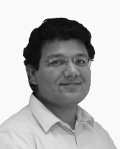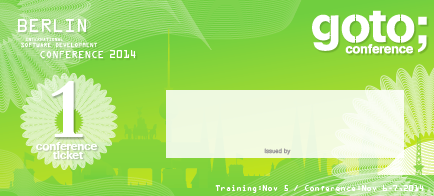GOTO Berlin is a vendor independent international software development conference with more that 60 top speaker and 400 attendees. The conference cover topics such as Java, Open Source, Agile, Architecture, Design, Web, Cloud, New Languages and Processes.
GOTO Night with Piyush Purang & Jacob Fahrenkrug
Host: Piyush Purang, Jacob Fahrenkrug
When: 1. Oct 2014 at 19:00 - 21:00
Where: Kosmos, Karl-Marx-Allee 131a, 10243 Berlin
Abstract
We invite you to an interesting GOTO Night with
Piyush Purang and Jacob Fahrenkrug
on behalf of GOTO Berlin.
Date October 1, 2014
Time 19:00 / 7PM
Venue Kosmos Berlin
Address Karl-Marx-Allee 131a, 10243 Berlin (Google maps) - use entrance right hand site of the building
Venue Kosmos Berlin
Address Karl-Marx-Allee 131a, 10243 Berlin (Google maps) - use entrance right hand site of the building
Cost Free of charge
Snacks & refreshments included
Speaker Piyush Purang, Jacob Fahrenkrug
"Abstractions" by Piyush Purang
Abstract:
This is an introductory talk on abstractions. Defining "abstraction" is difficult and we want to focus on unambiguous or sound abstractions and the laws that make them such. We take a very simple task and see where the road of abstractions can take us and what names if any such abstractions carry. One of the main goals is to make you excited about the world of sound abstractions and a secondary goal is to show how Scala or other powerful type systems allow you to express these concepts without peeking at the type of values using runtime reflection or such.
Description:
What is an Abstraction? Are all abstractions leaky? What has a semigroup, monoid or such to do with abstractions? How does abstraction relate to generalization? How do you use abstractions in your favourite programming language?; and no AbstractSomethingSomething isn’t an abstraction. How about Design Patterns - do they fit in somehow? In this talk we aren’t chicken and we go through some tough questions not necessarily in the same order or detail but we certainly do.
The talk will use Scala for code examples but could just as easily have used Haskell or others with a powerful enough type system. We will encounter type classes, higher kinded types etc. along the way.
To prime yourself for this talk please do the following task. This is a recommendation and not a requirement so don’t worry too much if you can’t manage it.
In any programming language of choice create a function, let’s call it sum (name doesn’t really matter), that takes a list of integers and computes and returns the sum of those integers. After you have accomplished this rather simple task, introduce abstractions that allow you to use the same method in different scenarios. Try to minimize the code you have to introduce and maximize the utility/applicability. Here are some questions, whose answers should help you along.
- What if it were a list of floating point numbers/doubles?
- What if it were a list of Strings? What should be the result?
- What if it were an Array, Queue, Sequence, Vector or other such Iterable structures of integers? A tree of integers?
- What if it were a Map/Associative-Array from Strings to Integers?
- What if sum in another universe should be sum(List(1,2,3,4,5)) == 120. What sort of sum is that? Oh no! guess what that universe is really ours. Are we doomed? Hint: Don't think about the + sign too much.

Bio:
Piyush Purang has been bringing the local Scala Community together to learn and discover the possibilities opened by the next BIG thing on the JVM. Ever since a life changing event of making (his) first contact with Functional Programming at the Oxford University as part of his Master of Sciences, he has been a proponent of good type systems and the life beyond reflection, annotations, IOC containers, imperative mutation -- in short the so called Enterprise side of things. He loves writing code and some of that can be found at github.com/ppurang. Piyush has close to 14 years of experience in varied roles working with engineering teams in projects across Europe and America.
Twitter: @ppurang
You can find all the presentation and mentioned links here.
"SmartHome is more than home automation" by Jacob Fahrenkrug
Abstract:
The term SmartHome is connected to home automation in most peoples heads. But - SmartHome is more then that. It is the network of all the things and people that live in a home. SmartHome concisely integrates the most important social network - the family - with all other aspects of digital and non digital life. Life-care, media-, internet-consumption and assistent-living are in the center of the SmartHome. Nearly all solutions that currently are available in the market ignore that fact. This talk deals with the questions of the consequences for users and SmartHome
providers if one broadens the focus. We raise the questions for the technology changes that we need to make in order to create a secure  and trusted SmartHome experience.
and trusted SmartHome experience.
Bio:
Jacob Fahrenkrug is yetu´s Chief Technology Officer (CTO). Jacob started his professional career at Hypoport Group, where he took technical responsibility for the mortgage market place in the Netherlands. Following that Jacob became Chief Software Engineer in charge of development and technologies for a business unit of Deutsche Post DHL. In 2014 he joined yetu as Lead Architect driving yetu´s open Smart Home Platform technologies. In May 2014 Jacob was appointed as yetu´s Chief Technology Officer. Jacob is a keen technologist and regular speaker at conferences on technologies, software architecture and agile software development.
Win a ticket to GOTO Berlin
We will raffle one ticket to GOTO Berlin amongst all participants of the Code Retreat on site.

Registration
For any questions do not hesitate to contact Dajana Günther.
We're sorry, registration is closed
